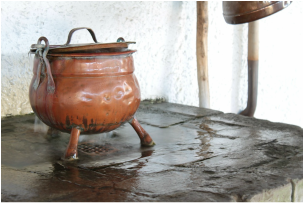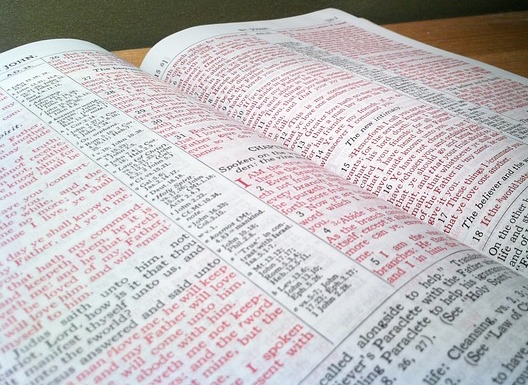Lessons from the textThe Anointing Is Not Enough Verse 20 of this chapter states that the anointed of God were taken in the pits of the enemy. Despite being anointed by God, they were overrun by their enemies. How could this happen? Does not the anointing from God mean that you are under divine protection? Why would God allow His anointed, His priests, His prophets, and His people, to be victimized? Isaiah gives us the answer. Behold, the LORD'S hand is not shortened, that it cannot save; neither his ear heavy, that it cannot hear: But your iniquities have separated between you and your God, and your sins have hid his face from you, that he will not hear. When God anoints a person, He envelopes him in divine protection. That person gets special privileges, entering into a close relationship with a member of the Godhead, the Holy Spirit (to be anointed is to be filled with the Spirit). That person also receives clear direction from God on what to do in situations. However, if that person choses to rebel against God’s instructions and against the Holy Spirit who is communing with him, then even if the anointing is still present, the person may be vulnerable to the consequences for sin. In the case of the Old Testament Jews, the Holy Spirit communed with the priests from the holy of holies inside the innermost room of the temple in Jerusalem. They were given specific instructions through the writings of Moses on what was and was not acceptable to God. The high priest went through a special ceremony to demonstrate outwardly the inward promise of the presence of the Holy Spirit on the high priest. Yet despite all of this, they choose to allow idols to be inserted and worshiped inside the temple. The high priests directly disobeyed God in this sense and also by failing to share the truth of God’s word. Even though God was still in their midst pleading with them (through the true prophets such as Jeremiah), they ignored God’s words and continued in sin. The consequence was that God could no longer justify defending a sinful nation. While He never left the Jews, He could no longer offer divine protection because then He would be endorsing their sins. No matter how strong someone may be anointed by the Holy Spirit, if that person fails to obey the Spirit and seek after sin, that person will ultimately be held responsible for choosing sin over righteousness. The anointing alone simply is not enough to save you from the consequences of sin. You must choose righteousness over wickedness. Verse by Verse Commentary 1-2 Jeremiah laments the holy temple. He has mourned over the people (Lam. 1) and the city (Lam. 2) and now he delves into more details. 3-11 While even the vilest wild beasts have enough to provide for their young, the Jews are unable to support their children. They have even had to sodden, or bake by boiling, their own children to survive the famine. The rich are satisfied with dunghills, and the Nazarites are withering away. (For the law of the Nazarite, see Number 6:1-21.) Jeremiah realizes that this prolonged judgment is worse than the instant judgment of Sodom; the Sodomites only suffered for a moment whereas the Jews are slowly dying from hunger. This is the fierce anger of the Lord manifested against the sins of the people, for, unlike Sodom, the Jews were given the Laws from God and taught from the time of their origins (the exodus) about right versus wrong. It is worse to know the ways of God and to rebel than to never know the ways of God (II Pet. 2:21). 12-16 No one would have thought that Jerusalem would have fallen. After all the glorious things God did for the Jews (the parting of the Red Sea, the miracles in the wilderness, the miraculous conquest of Joshua and David, and even the slaying of Assyria during Hezekiah’s reign), the world in large expected God to deliver His people once more. Yet, because of their sins, God withdrew His divine protection and left them vulnerable to conquest. Two of these sins are: the priests have allowed innocents to be put to death and the people have not respected the holy priests and godly wisdom of the elders. 17 Jeremiah speaks as one among the people; even though he did not look to vain helps (idols, Egypt), he expresses compassion for their disappointment in their help. See Jeremiah 2:6. 18-20 Instead of being delivered from the enemy, the Jews have been hunted, overrun, and overcome. Noteworthy is that the anointing from God was not enough to save them from the consequences for their sins. Despite their anointing, the priests and prophets turned from God and allowed for innocent blood to be spilt, therefore falling into the judgment of God at the hand of a wicked nation; God has the power to deliver one from any trouble, but if one willingly disobeys God, then one has left the area of divine protection. 21-22 Jeremiah turns his attention to the Edomites. Unlike the Jews who will be restored (no more carried into captivity), the Edomites will be utterly destroyed. Their sins will be exposed and punished. Eom rejoiced to see the Jews suffer; they delighted in seeing the calamity of others but never thought that calamity would come to them (Oba. 1:12-14). God is making it clear that no one is exempt from divine punishment for sin. ___________________ Thank you for your faithfulness in studying God’s word. Please comment below to share what you learned from today's lesson.
0 Comments
Leave a Reply. |
Devotional Categories
All
Archives
September 2023
|
|
Join my mailing list!
|
Thank you!You have successfully joined our subscriber list. |
|
© 2024 Melissa Beaty
|
